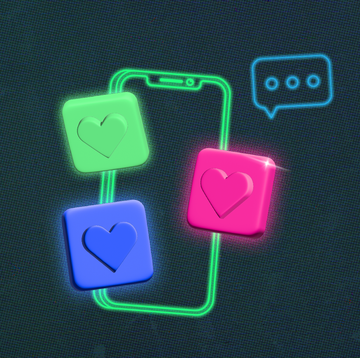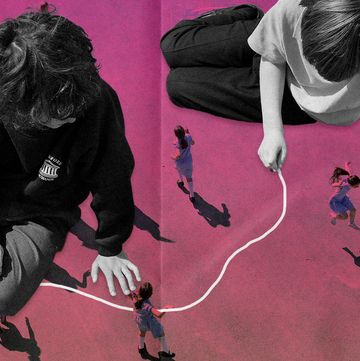When Hannah Gale breaks her silence, within seconds, the forum explodes into a hive of activity – even more so than usual. Users on the thread, made solely to talk about the influencer, rush at break-neck speed to comment on the update. “SHIT ME she’s leaving,” one user writes, while another claims, “No one will even notice in a week that she's gone. She was such a lazy blogger and influencer, she really didn't deserve the lifestyle she had somehow carved out for herself.”
The world of social media, for most of us, is an escape - a tiny glimpse into other people’s lives. We’re probably all guilty of sending screenshots to the group chat to dissect someone’s post, or lurking quietly on a person's page without ever directly engaging with them. And, at a time when we’re living out our lives online, in a moment in history where we’re regularly let down by our government, our police forces and our public figures, we’re probably all angrier than we’ve ever been. For many, the easiest outlet for that anger is through their keyboard.
Call out culture is more prevalent now than ever, with individuals, activists and groups lobbying for change by highlighting problematic behaviour. This is vital work, enabling brands, celebrities, influencers and regular people alike to be held accountable for their mistakes. But when your personal brand is, well... just you, can ‘call-out’ culture quickly veer into bullying? How do you make sure those lines aren't blurred, so that those in need of correction actually listen?
Hannah Gale, a beauty and lifestyle influencer who found success through vlogging and blogging, had over 87.3k Instagram followers before she quit the internet. While there were undeniably numerous factors involved in the decision, the trigger was that she was ‘called out’ for the inclusion of a racist slur, used in reference to getting a takeaway, in a 2013 blog post. Comments began to appear underneath her Instagram styled shots, demanding she confront her use of the derogatory word. This wasn't the first time a handful of her followers had raised the issue, with many saying they’d messaged her asking for it to be taken down for years. But Hannah claims she didn’t see the messages. Why? Because, due to years of trolling, she’d come to learn to ignore messages on blog posts, YouTube videos and her Instagram DMs.
Over on Tattle Life, the online forum site dedicated to discussing influencers and celebrities, the anonymous users were delighted. For over a year those on the site had been abusing her. She’s been called “lazy” and “a nasty, lurking flu that you can't shake.” Everything from her fashion choices to her parenting has been gossiped about. Faceless users comment back and forth in an echo-chamber of toxicity that borders on unhealthy; where lies are often dressed up as fact. Hannah says this year alone she’s had people tell her to kill herself and her unborn child, and has had her family’s private social media pages tracked down and pictures scrutinised. After the blog comment was raised online and the abuse intensified across platforms, it led to Hannah leaving social media and her blog behind for good. It was a career she’d been working towards for seven years.
What Hannah wrote absolutely needed addressing. She needed to know it was wrong. And, done in the right way, calling people out online can be a tool for growth and education. In the current climate particularly, where serious discussions about racism are finally happening, being held accountable is essential because racism in all forms is totally unacceptable. When handled well, call-out culture forces us to confront our faults and continuously check the way we conduct ourselves online. But should it have caused Hannah to quit her livelihood altogether?
Earlier this year, YouTuber Nella Rose apologised in a video after being called out for colourist tweets she posted eight years ago. In the video, she took full responsibility: “I’ve made a lot of people angry and I take full accountability for what I said,” she said, adding: “I know a lot of people were shocked. Even I was shocked reading back those tweets.” The YouTuber made it clear she’s grown as a person since then, and knows her words were indefensible. “I don’t really think that people should be defending me because, if you’re defending me, you’re encouraging that behaviour. That behaviour was wrong and that’s why I’m being called out for it, rightfully so,” she sincerely told her followers. By being called out, but taking responsibility, Nella Rose has earned back the trust of her audience and continues to have a successful YouTube career. She hasn't made the same unacceptable errors in judgment since.
In theory, here’s what should happen after every call-out: Someone does something wrong, people tell them, the person learns from it, apologises, and ensures they move forward knowing more and doing better. It seems simple enough. But when you take into account the daily trolling influencers constantly receive, it can inadvertently put up a barrier - muddying the waters somewhat, and meaning they're not always as receptive to genuinely useful feedback as they should be.
Make-up artist and influencer Katie Hayes, who receives hate regardless of what she posts (she was called a “fat truffle monster” for making truffle pasta), has seen just how ruthless the online world can be. When a fake Instagram account DM'd her a link to a forum where she was being talked about, she was stunned. “I was just completely and utterly gobsmacked,” Katie tells Cosmopolitan, “I couldn't believe what I was reading - complete and utter lies, fabricated lies. I was on forum six at this point, with 51 pages on each forum.”
Living life on social media comes with risks, which Katie acknowledges. But for her, the extent of the trolling was just so out of hand – she’s had private contact information leaked, and users on the site even claimed she faked her miscarriage. “It was really, really bad," she says. After falling into a dark place, Katie sought help from a psychologist for depression and is now staying off the site as much as possible to protect her mental and physical health. All this, without Katie ever publishing anything that was broadly deemed insensitive, or insulting. Imagine what could happen if she made a mistake.
But as humans, we all make mistakes. I’m sure if we examined our social media profiles there may be things we’re not proud of, which we could just delete. But for those who make a living by being online, any slip up is magnified and exposed to a larger audience. And that’s where calling out can quickly drift into bullying, affecting the lives and mental health of those involved. For influencers, there’s a real fear of losing an illustrious career and being ‘cancelled’ for a thoughtless error. We should absolutely be held to account for wrongdoings - certainly when they ignore or hurt the feelings of others on a big scale - but should being called out automatically have to mean a career death sentence?
Jodie Cook, social media expert and founder of JC Social Media, explains how the slope between criticising and bullying influencers can be a slippery one: “The nature of social media and its focus on shock and outrage can lead to warranted criticism crossing the line into abuse. Person A writes a message to someone. Person B responds with a nasty comment, person C retweets. Person D jumps on the bandwagon and person E is a journalist who writes about it. Suddenly it’s spiralled and it certainly feels more like abuse than criticism.”
When we call people out online, it’s important it doesn’t cross the line into bullying – because the two aren’t the same. It’s easy to get carried away and over-punish. For influencers who have experienced the worst of online bullies and are called out constantly for the most ordinary things, their already heightened defences mean they’re less likely to listen, even when it’s a valid point.
The bloggers we think we know have parts of their lives that aren’t shared; stress, worries, anxieties, issues that are kept private. Their status as influencers may give them power, but they’re not infallible. We must remember this when we hold them to account. “If you must communicate criticism online, aim to come across as level-headed and reasonable. Don’t use emotive language or exaggeration because it takes away your credibility. Calmly and clearly state the facts. Next, think about if there’s anyone you wouldn’t want to see what you’ve written. What does it say about you? You don’t want to come across as unreasonable, impatient or angry online. Spread positive vibes wherever you can and you’ll feel much better for it,” says Cook.
To move forward, we must all learn to communicate better online. This starts by watching what we say in the first place and secondly, by communicating appropriately when something is off. Nobody is above criticism, but in an online arena where thousands of voices and opinions can be shared instantaneously, our critiquing should be done in a respectful way. At the end of the day, there’s always a human behind the screen and, ultimately, we want them to listen.
Sign up to our newsletter to get more articles like this delivered straight to your inbox.














